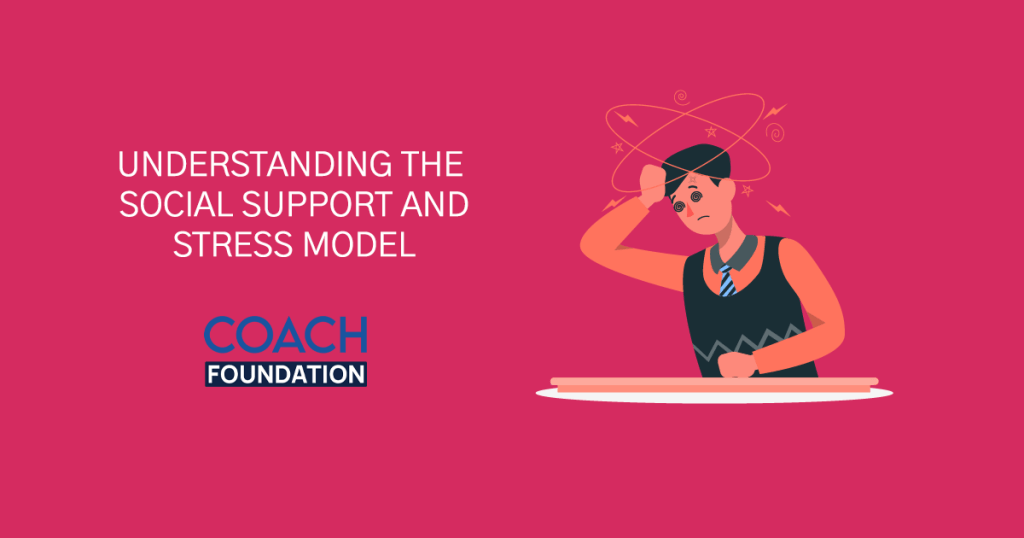Blog » Coaching Models and Techniques » Understanding The Social Support And Stress Model
Understanding The Social Support And Stress Model
Understanding the Social Support And Stress Model is essential for navigating the complex relationship between social support and stress. As someone who has personally experienced the impact of stress on my well-being, I have come to recognize the significant role that social support plays in mitigating its effects.

In this article, I will provide a comprehensive overview of the Social Support And Stress Model, exploring its various components and how they contribute to our overall well-being.
We will delve into what exactly the Social Support And Stress Model entails, highlighting its importance in understanding how social support can alleviate stress.
Key Takeaways
– Social support acts as a buffer against the negative effects of stress
– Different types of social support have varying effects on stress levels: emotional, instrumental, informational, and appraisal support
– Cultivating strong relationships and seeking supportive networks is important for managing stress and improving overall well-being
– Coaches can utilize the Social Support And Stress Model to provide appropriate resources and interventions
What is the Social Support And Stress Model?
The Social Support And Stress Model is a powerful framework that helps us understand how the support we receive impacts our stress levels. It suggests that social support plays a crucial role in mitigating the negative effects of stress on our well-being.
When we have strong social networks and receive support from others, it acts as a buffer against the harmful effects of stress. This model emphasizes the importance of relationships and highlights how they can provide us with emotional, informational, and instrumental resources to cope with stressful situations.
One key aspect of the Social Support And Stress Model is the recognition that different types of social support can have varying effects on our stress levels. Emotional support refers to receiving empathy, understanding, and love from others during times of distress. Extensive research has consistently shown that this type of support helps us feel valued and cared for, which in turn reduces our stress levels.
Instrumental support involves receiving tangible assistance, such as financial aid or practical help with tasks, when we are facing challenges. This form of support can alleviate some of the burdens associated with stressful situations.
The Social Support And Stress Model highlights the significance of social connections in managing stress. By understanding how different types of social support impact our well-being, we can make conscious efforts to cultivate strong relationships and seek out supportive networks in times of need.
With this knowledge, we can navigate through stressful situations more effectively and reduce their negative impact on our overall health and happiness.
Role of Social Support in Reducing Stress
Social support plays a crucial role in reducing stress levels and promoting overall well-being. When we have people we can trust, rely on, and confide in, it creates a sense of security and comfort that helps us cope with stressful situations more effectively.
One way social support reduces stress is by providing emotional assistance. When someone is going through a difficult time or facing a stressful event, having someone to talk to and express their feelings can be incredibly helpful.
The act of sharing our emotions with others allows us to release pent-up tension and gain perspective on our problems. It also reassures us that we are not alone in our struggles, which can be comforting and uplifting.
Another important aspect of social support is practical help. Friends and family members can offer tangible assistance when we are feeling overwhelmed or stressed out. Whether it’s helping with household chores, running errands, or offering childcare services, these acts of kindness alleviate some of the burdens associated with daily life stressors.
By lightening our load, social support enables us to focus on managing the core sources of stress more effectively.
The role of social support in reducing stress cannot be overstated. Emotional assistance and practical help provided by friends and family contribute significantly to our ability to cope with challenging circumstances.
Research shows that having a strong support system enhances our resilience in the face of adversity and promotes overall mental well-being. With such valuable benefits at stake, it becomes evident why cultivating meaningful relationships should be a priority for everyone seeking to reduce their stress levels.
Application of the Model in Life Coaching
As life coaches, appreciating the profound impact of a robust support system in mitigating stress can equip you with the tools to effectively apply the Social Support and Stress Model within your coaching practice.
The essence of this model lies in the role of social support as a buffer against the detrimental impacts of stress. Encouraging clients to actively develop and sustain meaningful relationships can pave the way for a support network consisting of friends, family, and colleagues who can provide emotional, informational, and instrumental assistance in challenging times.
Application of this model in coaching involves guiding clients in the intentional creation of robust bonds. This may entail motivating them to connect with individuals with similar interests or values, engage in group activities, and nurture open communication within their existing relationships.
This proactive approach enhances the probability of discovering supportive individuals who can offer advice or guidance during stress-filled periods. Moreover, instilling the value of active listening and supportive behavior in clients fortifies their sense of belonging and cultivates reciprocal relationships that stand the test of challenging times.
Grasping the nuances of the Social Support and Stress Model can empower you as life coaches to implement strategic steps towards stress reduction for your clients. Empirical evidence suggests that actively forging and nurturing supportive relationships lays a solid foundation for managing stress and ultimately enriching the lives of your clients.
How can coaches use the Social Support And Stress Model in their practice?
In applying the Social Support and Stress Model, I’ve found several ways coaches can use it effectively:
– Foster a supportive environment: Creating a safe and non-judgmental space allows individuals to feel comfortable seeking support from others.
– Encourage communication: Promoting open lines of communication between clients not only strengthens their connections but also provides an outlet for sharing experiences and finding solutions together.
– Build relationships: Helping clients develop meaningful relationships with others who share similar goals or challenges can enhance their social support network.
– Provide resources: As a coach, I strive to connect my clients with relevant resources, such as support groups or online communities that can offer additional support outside of our coaching sessions.
– Teach coping strategies: Equipping individuals with effective coping strategies like wellness techniques and mindfulness exercises empowers them to better navigate stressful situations while leaning on their social support system.
Conclusion
In conclusion, the Social Support and Stress Model provides valuable insights into how social support can reduce stress levels. By understanding the different types of social support—emotional, instrumental, informational, and appraisal—individuals can seek out the specific type that they need in times of stress.
Moreover, research has shown that having a strong social support network can buffer the negative effects of stress on physical and mental health.
By recognizing the role of social support in reducing stress, individuals can actively cultivate and nurture their relationships to strengthen their support system. Whether it’s seeking comfort from loved ones during challenging times or reaching out for advice and guidance from friends or professionals, harnessing the power of social support is crucial for managing stress effectively.
Incorporating the Social Support and Stress Model into our lives can lead to improved well-being by acknowledging the importance of social connections when dealing with stress. We can better navigate stressful situations if we recognize the various types of social support available to us and actively seek it out when we need it.
Frequently Asked Questions (FAQs)
What is the importance of the social support and stress model?
One cannot underestimate the significance of the social support and stress model. This model provides a framework for understanding how social relationships can impact an individual’s experience of stress and their ability to cope with it. It highlights the crucial role that social support plays in buffering the negative effects of stress and promoting well-being.
Understanding the importance of social support in managing stress is vital for coaches and practitioners in various fields. By recognizing this model, coaches can provide appropriate resources and interventions that address not only their clients’ immediate concerns but also foster a supportive environment.
Is the social support and stress model helpful?
Utilizing the social support and stress model can significantly enhance my ability as a coach to foster resilience and well-being in individuals. This model provides a comprehensive framework that helps me understand the complex relationship between social support, stress, and overall well-being.

ABOUT SAI BLACKBYRN
I’m Sai Blackbyrn, better known as “The Coach’s Mentor.” I help Coaches like you establish their business online. My system is simple: close more clients at higher fees. You can take advantage of technology, and use it as a catalyst to grow your coaching business in a matter of weeks; not months, not years. It’s easier than you think.
AS SEEN ON





